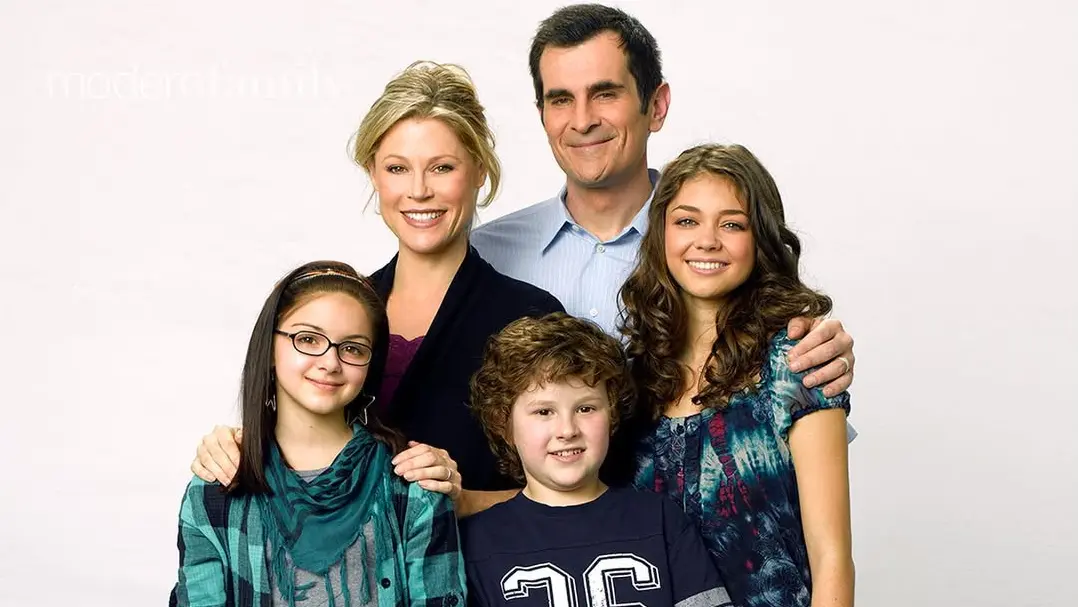Phil Dunphy on Modern Family was the quiet proof that optimism can be a family’s greatest inheritance
-
 Phil Dunphy with his wife Claire and children Haley, Alex and Luke in Modern Family
Phil Dunphy with his wife Claire and children Haley, Alex and Luke in Modern FamilyIn a variety of ways, Phil Dunphy of Modern Family is a unicorn when it comes to sitcom dads: part clown, part philosopher, all heart. You knew he was tethered to some hare-brained plan when he started to blabber on about esoteric optimism. This impossible guy wasn't just some dad comic, bobbing along in exaggerated excitement. Phil, brought to life by an Emmy award-winning performance by Ty Burrell, was a subtle radical, teaching us that optimism is not just a trait; it is a legacy and binds a family as they traverse through wreckage.
Modern Family (2009-2020) changed what a sitcom could be in its modern mockumentary format. The show had the Pritchett-Dunphy family, which had three entwined households.
While the storylines were action-packed and comedic, the brand of dad represented by Phil stood out. Phil was the dad who turned every blunder of parenting into a glorious opportunity. Phil was unlike sitcom dads in the past, who could be gruff and aloof.
He was a realtor with a childlike enthusiasm for life, and his blundering or dubious decisions had absolutely nothing to do with "efficiency," but rather communicating well with his kids.
Phil's gladmanship was not always there for comic relief, or perhaps it was. For Phil, being optimistic was part and parcel of navigating the waters of parenting.
Phil's rubric, "Never be afraid to go for the hug," grounded his understanding of fatherhood based on connection over control.
Phil Dunphy: The heartbeat of optimism in Modern Family
Phil’s positivity was no accident—it was a choice. When his daughter Haley flirted with rebellion or his son Luke flunked another test, Phil didn’t default to discipline.
Instead, he offered goofy pep talks or wild metaphors, like comparing life to a real estate deal: “You gotta keep showing the house!” In Season 6, when the Dunphy home experienced a plumbing catastrophe, Phil didn't lose his cool; he turned it into an indoor family camping trip.
Research from the Journal of Positive Psychology (2019) states that optimistic parents help foster resiliency in our kids. Phil Dunphy exemplified this by using joy as an armour from the disorder of real life.
Phil redefined the stereotype of "dumb dad," like Al Bundy or Peter Griffin. He wasn't absent-minded; he was simply fearless in being vulnerable. He laughed, owning his mistakes with a grin.
This reframe of fatherhood showed strength not in control but in adaptability. As Claire, his high-strung wife, wrestled with perfectionism, Phil’s laid-back optimism balanced her, proving dads can lead with heart over authority.
Teaching through “Phil’s-osophy” in Modern Family
Phil’s quirky wisdom, immortalised in his “Phil’s-osophy” book in Season 4, was more than a gag. Pearls like “Dance until your heart explodes”, “If you’re not impressed with the picture of the first Black president, you’re probably a racist”, or “Always look people in the eye, even if they’re blind” were absurd yet profound. They encouraged him to model for his kids—Haley, Alex, and Luke—how to embrace the messy side of life.
By Season 11 of the series, as the Dunphys were preparing to launch out into college and new beginnings, it was evident that Phil had impacted his kids: they were daring, imaginative and willing to stumble because Phil had modelled for them that failure is a necessary stop on the road to joy.
Phil’s impact extended far beyond Modern Family. On X, fans called him “ultimate dad goals,” or “the dad we all needed,” with posts celebrating Phil’s ability to make being vulnerable heroic.
In a 2021 interview with Vulture, co-creator Christopher Lloyd remarked,
“Phil was the beating heart of the show—his optimism gave everyone permission to be themselves.”
In a time that often feels heavy-laden with cynicism, Phil’s simple hopefulness permitted him to dream of better days and was like an act of quiet rebellion, encouraging viewers to choose hope over despair.
The ripple effect on family dynamics in Modern Family
Phil's unfailing optimism not only helped his children; it supported his marriage. In episodes featuring Phil and Claire, from sneaking away to a romantic getaway to dealing with Claire's stress, it reveals partnership as a balance.
In Season 7, when Claire was self-doubting her release as a parent, Phil's commitment differentiated himself by constantly bringing it back to 'they were in it together.'
This dynamic, fueled by Phil's unbelievable optimism, made the Dunphys an actual relatable model for muddling through family strife that we sometimes experience in the real world.
Phil Dunphy was not perfect. He burnt pizzas, did not adequately perform his dance moves in his wedding, and one time was stuck in a porta-potty (seriously though, poor Phil!). However, accepting Phil's shortcomings only enhanced the power of optimism. He effectively showed us that joy is not implicit; it is this radical act of persistence - a gift that reminded all families that joy encourages stability.
A message we can take from Phil is the act of choosing to see the good; Phil provided his family (and everyone watching him) a map to using their joy as a fuel to successfully navigate the chaos life can be.
Want to immerse yourself in Phil's optimism yet again? You can watch Modern Family on Hulu, Peacock, and Disney+ to revisit the joy and laughter Phil provided the world.
TOPICS: Modern Family
- Who did Helen Siff play in Modern Family? Career explored as character actress passes away at 88
- Modern Family stars reunite for a musical showdown on Celebrity Name That Tune season 5 premiere
- When will Celebrity Name That Tune season 5 air? Release date, what to expect, and more
- Modern Family wasted Haley Dunphy’s smartness with an ending she didn’t deserve